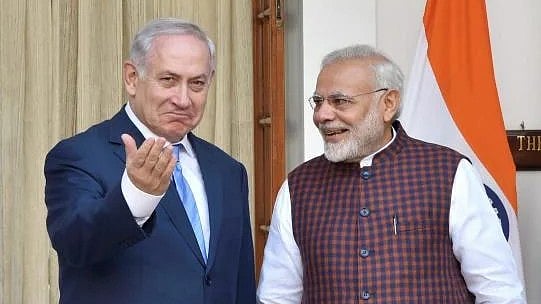
Prime Minister Narendra Modi and his Israeli counterpart Benjamin Netanyahu.
Credit: PTI
India has lost its strategic autonomy with Israel. The only country with which India has no strategic autonomy, and is constrained in taking independent actions or decisions is Israel.
To understand the severity of this predicament, it is not necessary to look beyond a statement issued by the Ministry of External Affairs (MEA) in New Delhi on September 9, shortly after Israel blatantly violated the sovereignty of Qatar and bombed its capital, Doha. The MEA statement did not dare to call it a bombing, which even United States President Donald Trump did. The US is Israel’s closest ally. “Unilaterally bombing inside Qatar, a sovereign nation…” is how Trump expressed his great unhappiness about Israel’s action.
In contrast, look at India’s feeble statement. “We have seen reports about the Israeli strikes in Doha earlier today. We are deeply concerned by this development and its impact on the security situation in the region.” Merely ‘concerned’ over what amounts to an egregious violation of international law and the United Nations Charter, which ought to be strongly ‘condemned’?
There are two reasons for the MEA’s weak-kneed response. Prime Minister Narendra Modi called for ‘diplomacy and dialogue’ in Ukraine while talking to Russian President Vladimir Putin three years ago. That, and similar accompanying words, elicited global praise for Modi. Ever since, chronic sycophants in the bureaucracy sprinkle Modi’s words — like diplomacy and dialogue — in place and out of place in its statements on every crisis.
The second reason is that the MEA is not immune to the country’s political environment. It senses that the existing political flavour is all-out support for Tel Aviv and swims with this current. If it does not, Foreign Secretary Vikram Misri may be viciously trolled again by India’s Right-wing nationalists. External Affairs Minister S Jaishankar’s security may have to be further tightened because of domestic threats.
Official response to Israel’s aerial attack on Doha was only the latest example of congenital sycophancy. “We strongly urge restraint and diplomacy,” the MEA advised all parties without making any distinction between the aggressor and the victim. Fortuitously for India’s standing in the world, Modi understood this fatal flaw and took matters into his hands the following day. He unequivocally ‘condemned the violation of the sovereignty of the State of Qatar.’ He called up the Amir of Qatar, Sheikh Tamim Bin Hamad Al Thani, and asserted that “India stands firmly in support of peace and stability.”
Qatar is now at the front and centre of global diplomacy following Israel’s aggression. UAE President Sheikh Mohammed bin Zayed Al Nahyan, rushed to Doha and was the first head of state to visit Qatar after it was attacked. In a ‘tough’ meeting with Israel’s President Isaac Herzog on September 10, United Kingdom’s Prime Minister Keir Starmer, condemned the air raid on Qatar as “a flagrant violation of a key (British) partner’s sovereignty.” The European Union may “suspend trade-related measures” with Israel, and Canada’s Foreign Minister Anita Anand said she is “evaluating its relationship with Israel.” Russian Foreign Minister Sergei Lavrov spoke with Qatar’s leadership and said Israel’s attack was “an unacceptable encroachment on the sovereignty and territorial integrity of friendly Qatar.”
Imagine how weak, subservient and helpless India would have looked if Modi had not gone beyond the MEA’s feeble statement and reclaimed the willingness to condemn Israel’s actions when it was called for. That said, it is unlikely that even Modi can sustain the momentum of his sympathy for those in the Gulf and the broader Arab world, who are living in mortal fear of the leadership in West Jerusalem. The national mood in India is one of indulgence of Israel.
Such a mood has moved beyond just indulgence towards complicity. What can one say about this country’s strategic autonomy when protests against genocide in Gaza are suppressed across India, sometimes violently, sometimes through judicial activism, at other times via law enforcement!
Israel has cleverly manipulated this mood in its favour at all levels. Since Independence, there have been concerns in India about the activities of the US Central Intelligence Agency (CIA) and its Soviet counterpart, best known by its Russian acronym, the KGB. Israeli penetration of all walks of Indian life since New Delhi established full diplomatic relations with Tel Aviv three decades ago far surpasses what the two superpowers have done.
Many academic institutions across India have surrendered their freedom of thought to Israel in exchange for scholarships, academic junkets, and paid indoctrination. Reports appear in print from time to time about its fallout, but to no avail. The media — especially its less informed sections — are in thrall of Jewish disinformation.
Compounding all this is India’s overdependence on Israel’s formidable defence establishment. Some of it is known publicly, but it is mostly under cover. To be fair, India ought to be grateful to Israel for its defence cooperation — help, in fact — during critical times for this country.
Surrender of strategic autonomy is the price India is paying for all this. Like South Korea’s or Japan’s subservience to the US in exchange for security. India, after all, cannot have the cake and eat it too.
K P Nayar has extensively covered West Asia and reported from Washington as a foreign correspondent for 15 years.